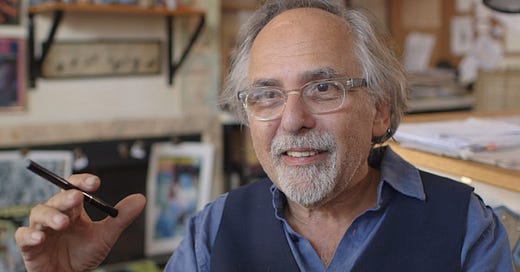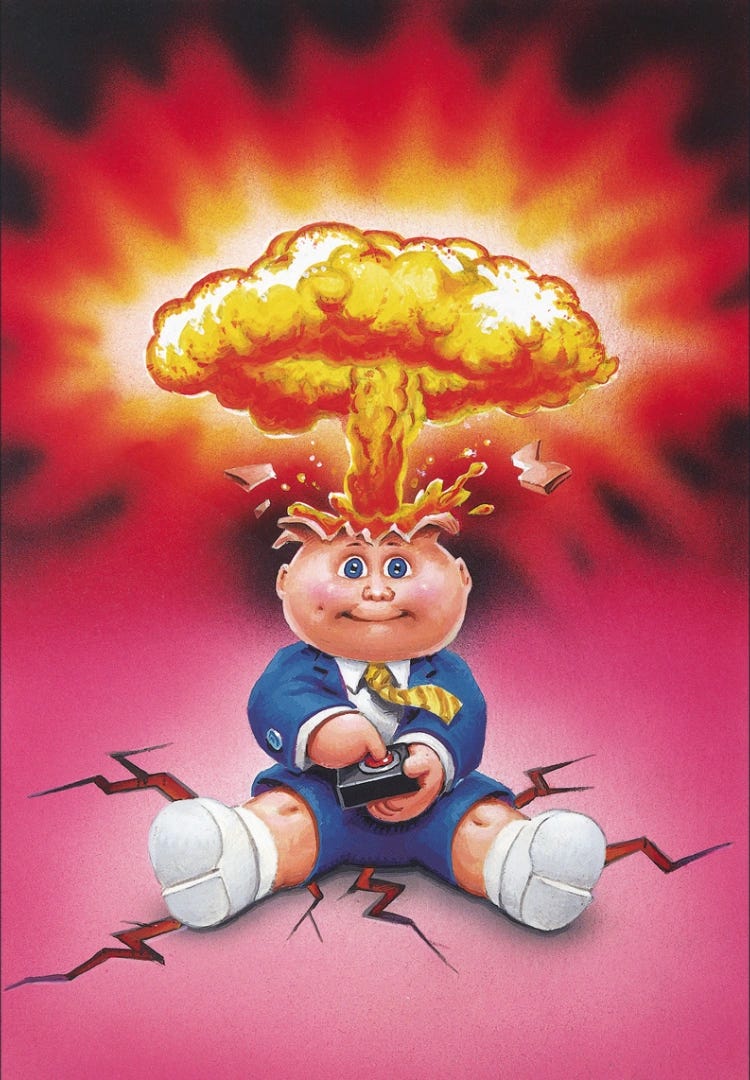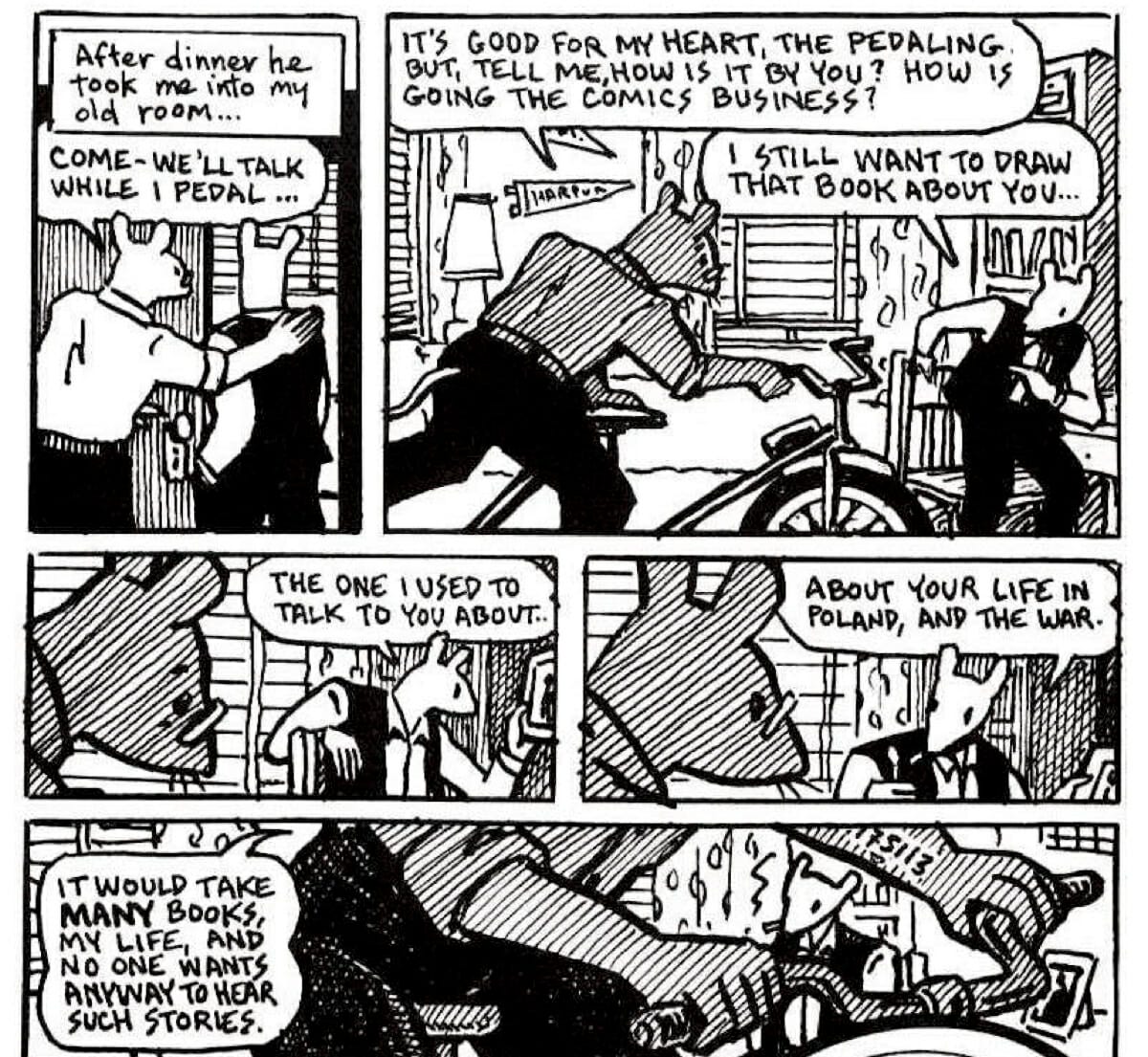Art Spiegelman: Disaster Is My Muse Review - The Mausketeer
You'll never believe what else the renowned Holocaust comic author created
The Holocaust is such a serious and somber event, and rightfully so considering the growing numbers of people who need to be educated on the topic, that anyone who makes a significant work of art based upon it automatically gets elevated to the role of Very Serious Artist. Steven Spielberg was still mostly thought of as an expert popcorn-filmmaker until he made Schindler's List, after which even many of his pop-entertainments (like War of the Worlds) took on an air of seriousness. Jerry Lewis, feeling his own Holocaust movie didn't rise to the level of gravitas necessary, shelved The Day the Clown Cried forever.
And Art Spiegelman did Maus. If you aren't familiar, it is to comics what Schindler's List is considered for cinema. (I say this because I am not the world's hugest fan of Schindler's List – I think there are lesser-known Holocaust movies that do better. But pop-culturally, it is the gold standard.) Spiegelman's two-part “graphic novel” (originally published in smaller installments, hence the quote marks) depicts the Holocaust as told by Spiegelman's father, with Jews represented as people with mouse-heads and Nazis with cat heads. It's in the crosshairs of the culture wars again, as one of the books now being banned over DEI or whatever other pretext they come up with for keeping children in public schools away from anything objectionable. Ostensibly, scenes of prisoners stripping down are the problem, though to my best memory, Maus shows no explicit nudity. I think we all suspect that a growing support by the wrong people for the wrong side in that historical situation may have a thing or two to do with it as well.
It all seems so very serious, doesn't it? So here's something that may blow your minds: Art Spiegelman, creator of Maus, also invented the Garbage Pail Kids. If you're old enough to remember learning that the director of Heavenly Creatures previously made Bad Taste and Meet the Feebles, you may be experiencing deja vu. It's the biggest revelation in the new documentary Art Spiegelman: Disaster Is My Muse, which also posits that indeed, you can draw a straight line from '70s underground comix to Garbage Pail Kids and then Maus, in that it took those predecessors to break open the door of traditional notions of what comics and trading cards could be, and allow artists to follow their muses every which of way.
Indeed, if Disaster Is My Muse were part of a cinematic universe, it would be alongside Terry Zwigoff's Crumb rather than Schindler's List. Crumb and wife Aline Kominsky-Crumb make appearances at the Spiegelmans' dinner table here, and they remain bonded by their time in counterculture comics, though Spiegelman has much more successfully pivoted to mainstream success. Crumb coded his fetishes and neuroses into his more caricaturish worlds, while Spiegelman often came right out and depicted them exactly as they were, as with one realistic comic about his mother's suicide.
Both are counterculture Boomers, of the sex, drugs, and rock & roll era, and it infuses even Spiegelman's “serious” work. Those who've canonized Maus in their minds without actually reading it might be surprised to know that it's not the self important master's thesis that Schindler's List is, but framed as a very real, sometimes comedic and often disagreeable series of conversations between father and son. By developing the skills and personality necessary to survive the Holocaust, the senior Spiegelman had trouble adapting back to a world of peace and prosperity, and wasn't exactly father of the year material. Maus doesn't shy away from showing this, even as it tales his memories extremely seriously. It was initially published, in its first form, in a publication called Funny Aminals [sic] which allowed cartoonists to do whatever they wanted, adult content encouraged, so long as it involved anthropomorphic animals. Spiegelman, using the Jews-as-vermin concept espoused by the Nazis came up with the mouse metaphor then.
It's maybe less of a surprise to people who actually know the material that Spiegelman still comes across as the quintessential '60s rebel, one who for years was so tired of talking about his ordained masterpiece that he wrote another book as an FAQ so he'd never have to talk about it again. Now he's talking about it again, and this film presumably exists for the same reason he is: he sees fascism on the rise once more, and feels duty bound to sound the alarm, even as he can't help making jokes still.
Filmmakers Molly Bernstein and Phil Dolan talk to as many of his peers as they can; their best filmmaking flourish is to get Spiegelman to read some of his signature strips aloud while they appear onscreen, panel by panel. Tone doesn't always translate the way writers intend, and adaptations of comics sometimes ruin things with voices unlike the ones we imagine in our head, but for Spiegelman's comics about himself, his voice is definitive, and hearing it come from the literal pages brings them to life as they should be. As he's not an actor, we'll likely never get him performing a full-length motion comic, but moments of a potential one add flavor here.
Spiegelman says early on that he never wanted to be the Elie Wiesel of comics, and the movie feels like a worthy attempt to dispel aspects of the myth while showing why maybe only he could have done what he did. His greatest works may be inspired by tragedy and disaster, as the movie's title suggests – Holocaust, maternal suicide, 9-11 – but he's very human in how he approaches it, remembering that sometimes you need to end on a joke even in the ruins. He wants you to know him better, and after this, you'll feel like you do.
Art Spiegelman: Disaster Is My Muse premieres tonight and tomorrow in New York City at Film Forum, with a wider release scheduled later this year.







Jeet Heer covers the story pretty well and includes an update that accurately depicts the panels that parents were concerned about on his Substack.
https://jeetheer.substack.com/p/maus-in-tennessee
Removing the book from the curriculum is a foolish and narrowminded approach (https://www.pbs.org/newshour/arts/holocaust-novel-maus-banned-in-tennessee-school-district). While the comic is for adults/older teens and not a "kid's book," it was being read by high school students and is perfectly appropriate for them. It's a valuable tool that lets you read about the holocaust without seeing actual disturbing videos of the real event, which I did during my Holocaust and Genocide course at the University of Nevada. I also wrote a paper on Holocaust denial which led me down the rabbit hole of that mentality. A mentality that horrifies me to this day.